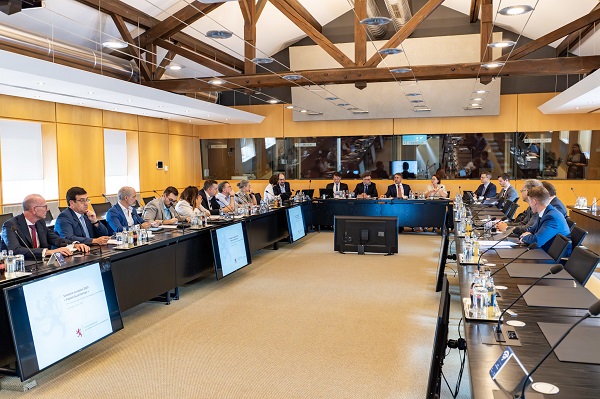 Credit: ME
Credit: ME
On Wednesday 21 June 2023, Luxembourg's Prime Minister Xavier Bettel, the Minister of the Economy, Franz Fayot, and the Minister of Finance, Yuriko Backes, met with the social partners at Senningen Castle in the framework of the 2023 cycle of the social dialogue of the European Semester.
On this occasion, the members of the government presented their views on the European Commission's new 2023 country report for Luxembourg, as well as the new country-specific recommendations 2023-2024 proposed by the Commission, which concern the long-term sustainability of public finances, the implementation of the recovery and resilience plan, the school system and the energy transition.
This second meeting of 2023, which followed that of April, saw the government and social partners discuss how to respond to the recommendations that were addressed to Luxembourg following the submission of its national reform programme and its stability programme. The government also presented the state of progress of the REPowerEU component of the recovery and resilience plan, for which Luxembourg is allocated a budget of nearly €160 million in order to reduce dependence on Russian fuels and accelerate the ecological transition.
In his introduction, Prime Minister Bettel stressed that "Luxembourg, in international comparison, is coping rather well with the multiple crisis situations with which we are confronted. The economy is sluggish across Europe, inflation at record levels. However, Luxembourg has the lowest rate of inflation, and the second best growth in Europe. This is notably the fruit of the social dialogue and the agreements that we have reached with the social partners during the many tripartite meetings of recent years."
Minister Fayot stated: "Even if they are not directly linked to the European Semester procedure, the various tripartite discussion platforms have made it possible to find solutions in difficult economic situations, together and in consultation with the social partners. Despite the successive crises, this approach has enabled Luxembourg to preserve social peace and make progress in the green, digital and inclusive transition of its economic model. Through numerous initiatives, programmes, support measures and financial aid, the government continues to support companies in terms of decarbonisation and energy transition to maintain their competitiveness and safeguard jobs."
Minister Backes highlighted that "the national social dialogue meetings within the framework of the European Semester make it possible to discuss with the social partners the challenges facing our country. Despite the significant impact on public finances, the measures taken in the framework of recent tripartite meetings have made it possible to limit inflation. The effects of these measures are reflected in the inflation rate observed in Luxembourg, the lowest in the EU since the beginning of the year. Today's meeting notably allowed us to discuss with the social partners the latest recommendations of the European Commission, an important denominator for our reflections at national level, as well as the state of progress of the recovery and resilience plan and REPowerEU, a plan that will allow us to promote the energy transition."
Note that the European Semester is the European Union's framework for the coordination and surveillance of economic and social policies. Since 2015, the social partners in Luxembourg have met regularly with government representatives several times a year to discuss the key elements of this coordination cycle.








